Search Results for: dtsa
Federal Cause of Action for Trade Secret Misappropriation
Guest Post: Why we Need a Seizure Remedy in the Defend Trade Secrets Act
Goldman on Ex Parte Seizures in Trade Secret law
Op Ed: Reflections on the American Invents Act on its Tenth Year Anniversary
DTSA Litigation Updates
DTSA Litigation Begins
White House on Non-Competes and Trade Secrets
Defend Trade Secret Act Moving Forward
Trade Secrets Pre Patenting
Implementing and Interpreting the Defend Trade Secrets Act (DTSA)
Introducing the Trade Secret Case Management Judicial Guide
Nationalizing Trade Secret Law
Epic Trade Secret Case Billion Dollar Verdict
Trade Secret Law
Federal Circuit Upholds ITC Import Ban: Key Rulings on Storage Defense and Domestic Industry Requirements
by Dennis Crouch
The Federal Circuit has affirmed a US International Trade Commission (ITC) determination that Wuhan Healthgen violated Section 337 through importation of clinical-grade recombinant human serum albumin (rHSA) products that infringe Ventria Bioscience’s U.S. Patent No. 10,618,951. Wuhan Healthgen Biotechnology Corp. v. International Trade Commission, No. 2023-1389 (Fed. Cir. Feb. 7, 2025).
The patentee in the case – Ventria / ExpressTec – is a small biotech company operating out of Junction City Kansas. Their asserted patent is directed to a cell culture media containing rHSA produced via plants genetically modified to include the human genes. The albumin is basically a protein food for growing human cells in artificial laboratory environments. Traditionally, the albumin came from animal sources, such as blood serum, but the plant process has some easy to identify benefits. A key feature of the patented invention is monomer purity. Ideally, the albumin will be in monomer form as opposed to forming dimers or other aggregated groups, and Ventria’s patent particularly requires “less than 2% aggregated albumin.”
Wuhan Healthgen has been competing in the market by supplying its own version of the product exported from its Chinese production facilities and Ventria took action – in the ITC seeking a trade exclusion order of the infringing product. The ITC largely sided with the patentee. In this post, I focus on the domestic industry requirement and particularly how it applies to small innovative US companies. (more…)
Non-Patent IP Cases at the Supreme Court: December 2024 Update
I recently posted about pending patent cases before the Supreme Court, this post goes into the non-patent intellectual property cases:
On December 11, 2024, the Court heard arguments in Dewberry Group, Inc. v. Dewberry Engineers Inc., No. 23-900, addressing profit calculations for trademark misappropriation under Section 35(a) of the Lanham Act, 15 U.S.C. § 1117(a). This is the only IP case that has been granted certiorari this term. The dispute stems from a $43 million disgorgement award based on profits earned by companies affiliated with, but legally distinct from, the defendant. The central question is whether courts can consider affiliate revenues without first “piercing the corporate veil.”
During oral argument, the Justices focused heavily on corporate law fundamentals. Several appeared skeptical of the respondent’s argument that courts can treat affiliate profits as evidence of a defendant’s “true financial gain” without disregarding corporate separateness. The Court’s ultimate resolution could significantly impact how companies structure their IP holdings and licensing arrangements between related entities.
Two interrelated petitions examine internet service provider liability for copyright infringement. In Cox Communications, Inc. v. Sony Music Entertainment, No. 24-171, and Sony Music Entertainment v. Cox Communications, Inc., No. 24-181, the Court confronts important questions about secondary liability following a $1 billion jury verdict. The Cox petition challenges the Fourth Circuit’s holding that an ISP “materially contributes” to infringement merely by continuing service to known infringing subscribers. This arguably conflicts with decisions requiring either active promotion of infringement (Second and Tenth Circuits) or at least failure to implement simple preventive measures (Ninth Circuit).
Sony’s cross-petition addresses when ISP infringement qualifies as “willful” under 17 U.S.C. § 504(c). The Fourth Circuit held that knowledge of subscriber infringement suffices, while the Eighth Circuit requires evidence the ISP knew its own conduct was unlawful. This distinction has enormous practical impact—under the Fourth Circuit’s approach, the statutory damages ceiling automatically increases from $30,000 to $150,000 per work for contributory infringers. The Court has invited the Solicitor General to weigh in on both petitions — this will likely be submitted by the Trump Administration after January 20, 2025.
In King for Congress v. Griner, No. 24-321, the Court is presented with a circuit split regarding Rule 68 offers of judgment in copyright cases. The dispute involves the viral “Success Kid” meme, where a congressional campaign was found to be an innocent infringer (i.e., non-willful) yet sought to recover post-offer attorney’s fees under Rule 68. The Eighth Circuit joined the First, Seventh and Ninth Circuits in holding that copyright defendants cannot recover Rule 68 attorney’s fees because the Copyright Act limits fee awards to “prevailing parties.” Griner arguably won, but the total award was just $750.
Canadian Standards Association v. P.S. Knight Co., No. 24-537 asks whether privately-developed technical standards lose copyright protection when incorporated by reference into law. The Fifth Circuit, applying its prior decision in Veeck v. Southern Building Code Congress Int’l, Inc., 293 F.3d 791 (5th Cir. 2002), held that both the government edicts doctrine and merger doctrine strip such standards of protection, regardless of their private authorship. The petitioner argues this conflicts with Georgia v. Public.Resource.Org, Inc., 140 S. Ct. 1498 (2020), which emphasized that copyrightability turns on the identity of the author rather than whether content carries legal force. The case has significant implications for U.S. treaty obligations under the Berne Convention and the sustainability of private standards development, as many technical codes relied upon by federal agencies are created by organizations seeking copyright licensing revenue.
The dispute in BMC Software v. IBM, No. 24-569 arose when IBM used its IT outsourcing position to help customer AT&T replace BMC’s licensed mainframe software with IBM’s competing products—violating a license provision prohibiting IBM from using its access to “displace” BMC’s software. The Fifth Circuit reversed a $1.6 billion damages award, holding the license restriction was likely unenforceable as a restraint on trade because it could limit AT&T’s software choices. BMC argues this creates a circuit split with four courts of appeals that recognize software owners have a “presumptively valid business justification” for license restrictions. The case raises fundamental questions about the intersection of copyright and antitrust law, particularly regarding restrictions designed to prevent competitors from leveraging privileged access to unfairly compete.
Rutstein v. Compulife Software, No. 24-634 raises a novel trade secret issue: whether automated web scraping should be treated differently than manual data collection under the Defend Trade Secrets Act (DTSA). The Eleventh Circuit held that using automated tools to collect insurance premium quotes from Compulife’s public website constituted misappropriation by “improper means,” even though manually collecting the same data would be legal. Critics argue this creates an arbitrary distinction based on collection efficiency rather than the nature of information access. The case could provide crucial guidance on how trade secret law should adapt to automated data collection technologies that power much of the modern internet.
Finally, T-Mobile v. Simply Wireless, No. 24-637, presents a circuit split over maintaining common law trademark rights. The Fourth Circuit held that once rights are established through “extensive use,” they persist until abandoned under Section 45 of the Lanham Act, 15 U.S.C. § 1127—even during extended periods of non-use. This allowed Simply Wireless to pursue infringement claims against T-Mobile despite having made no use of its mark during multiple multi-year periods. This approach conflicts with other circuits requiring continuous use until alleged infringement begins. The case could resolve whether the continuous use requirement applies only to establishing common law rights or extends to maintaining them, with significant implications for dormant mark enforcement.


